posc201 jmu exam 3 hammond
1/79
There's no tags or description
Looks like no tags are added yet.
Name | Mastery | Learn | Test | Matching | Spaced | Call with Kai |
|---|
No analytics yet
Send a link to your students to track their progress
80 Terms
Hobbes vs Locke vs Rousseau on the natural rights retained, natural rights renounced, and rights granted to the sovereign
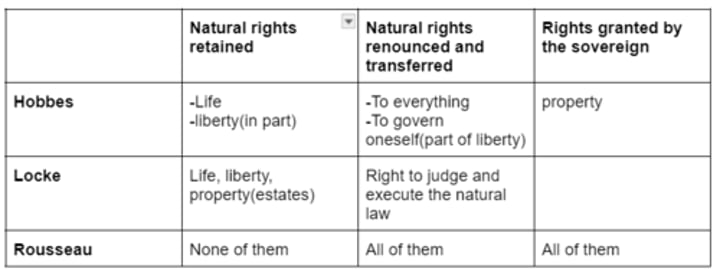
Who thinks human beings are social and political by nature?
-plato
-aristotle
-cicero
-St. Th. Aquinas
-etc.
who thinks human beings are neither social nor political by nature?
-hobbes
-rousseau
who think human beings are social, but not political by nature?
-locke
Thomas Hobbes(1588-1679)
highlighted words are the different sections
A new science of politics
knowledge of consequences:
Two branches that come from the same root:
-Natural philosophy(science)
-politics and civil philosophy
Natural philosophy(science)
-ethics
-science of just and unjust
(separate from politics(diff from traditional))
politics and civil philosophy
-investigates the rights and duties of the sovereign
-investigates the rights and duties of subjects
bodies in motion
-says all knowledge comes from experience and the substance is material(the world is bodies in motion and can be traced back to sense experience)
-every thought we have is a consequence of the reality outside of us (can be traced back to sense experience)
-when a thing is in motion, it will eternally be in motion unless someone stops it(people are bodies in motion)(pushed and pulled by our appetites)
how do human beings imitate god?
-human beings imitate god by making things artificial
-we give machines life
What is the best way to understand human nature?
-we create politics, meaning you can imagine a condition we are in where we are not by nature political(we are not naturally political + social)
-the best way to understand human nature is to remove yourself from politics
-even though politics are not natural, they are necessary
Voluntary motion
-the motion we control(endeavor)
1. appetite(desire)(motion toward)
2.aversion(motion from(fromward))
-everything can be reduced to an appetite or aversion, even love
-good and evil are relative to a person
-there is nothing simply good or evil
-we decide what is good based on our appetites
Appetites
-we can never be without appetites/desire
-in a state of nature each one of us decides what is good(we have reason but our reason is influenced by our appetites)
-completely different from plato
-we are constantly seeking to gratify those appetites
human nature(natural qualities common beings)
-felicity(constant pursuit). appetites, pleasure(what pleases us is what is good)
-human beings are insatiable. this produces scarcity. there are many objects that we all desire. conflict arises because of scarcity of material and our insatiable appetites. our desires are limitless, but materials are limited
-fear. we are naturally scared and fearful
-seek power. we have many different desires, but one thing we all want is power
liberty
absence of impediment
natural rights retained, renounced, and granted by the sovereign

what are men like in the state of nature
-in the state of nature, the weakest have the ability to kill the strongest
-we are equally vulnerable and equally moral in the state of nature
-insecurity, dissatisfaction, moral uncertainty
-"vain conceit of ones own wisdom" we all think we are the most wise and the strongest and we want other people to think so to
-if people don't value us, that causes us to to be angry
cause of quarrel in the state of nature
-competition
-diffidence(timid/nervous)
-glory
the war of all against all
-when men live without a common power(government), they are in a condition of war(all men against men)( we are naturally enemies)
-"bellum omnium contra omnes"- the war of all against all
-in a state of nature there is no society
-constant fear
-we cannot trust other people
-nothing can unjust in a state of nature because there is no natural justice(the desires and passions of men are not in themselves wrong)
what are the 2 natural virtues
force and fraud
2 reasons why we won't live in a state of nature
1. we must have an aversion to the state of nature
2. because we have reason, we can reason together to quit state of nature
-ratiocination
-reasoning -> logos
-individual reasoning -> reasoning we share
- we can reason it's in our best interest to leave the state of nature
Precept(general rule) of reason
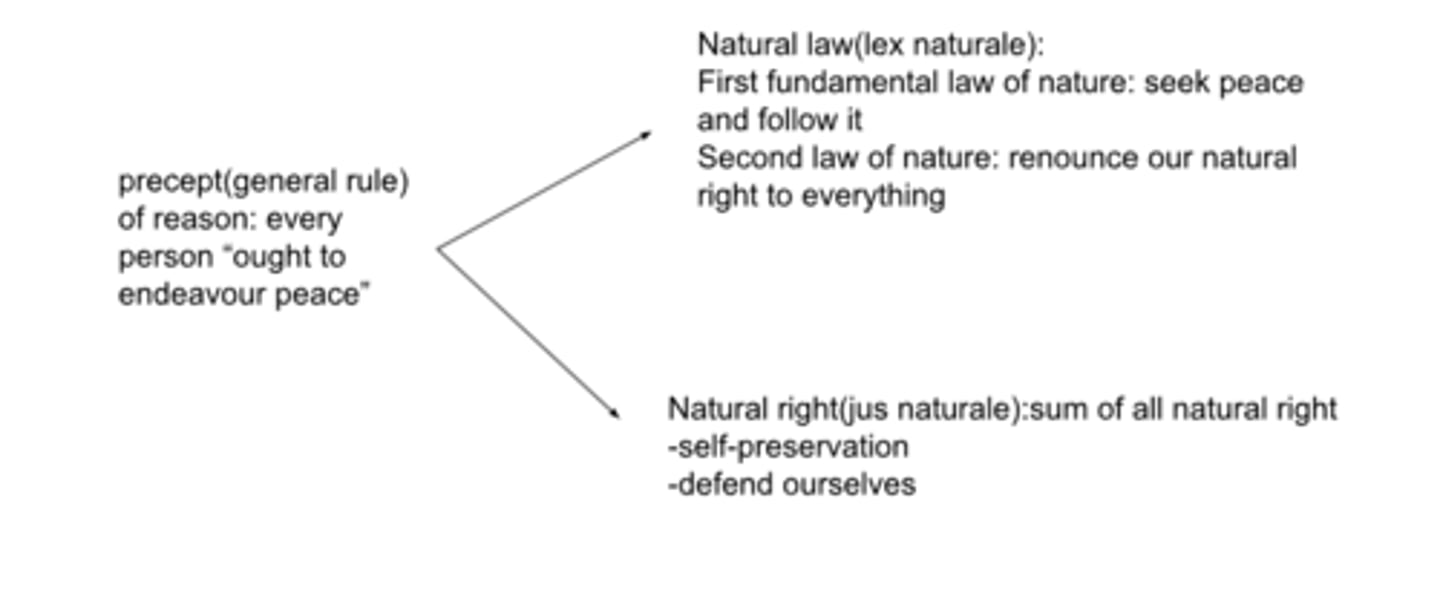
how do we have a natural right to everything in a state of nature?
-in a state of nature everyman has a natural right to everything
-because there us nothing in state of nature that we can't use to help us self-preserve
-we even have the right to each other's bodies
-if we have a right to everything then we actually have a right to nothing
-the right to everything is meaningless
How do we get government from state of nature
-government is based on contract
-we lay down some natural rights to secure other rights
-we renounce the right to govern ourselves
-sovereign determines the rights to property
-we need universal agreement/rules to be out of state nature
-everyone renounces their right to everything and transfers it to the sovereign
-people are the author of the sovereign, we build the artificial person
-the consent of the governed
laws of nature
1. seek peace + follow it
2. to lay down natural right to everything
3. keeping covenants(justice)
...
9.acknowledge equality
-the laws of nature is to do to others what we would do to ourself
-the laws of nature without the terror of some power to cause concern(the sovereign)
-natural laws are contrary to our natural passions
-natural laws are dictates of reason, but they are not laws but rather conclusions/theorems(they only have the force of the law with the power of the sovereign)
-the breach of "acknowledge equality" is pride
why we need sovereign
-we need the sovereign to support/secure everyone's right
-not saying we surrender all of our rights, but only some of them
-sovereign has the ability to make our natural laws into real laws
-nobody in state of nature has power
-having the right to everything is meaningless when you have no power to support them
-rights follow power
the rights of the sovereign
-cannot be unjust
-above the law(only person above sovereign is god)
-determines appropriate moral doctrines
-determines what is good/evil
sovereign matter and form

What us tyranny?
-monarchy disliked
-no such thing as tyranny
-just a king disliked
-sovereign cannot be unjust
good/evil in state of nature
-there is nothing worse than the state of nature
-even a bad government is better than state of nature
-there is nothing by nature good/evil
-Hobbes says people aren't evil, but rather they are simply protecting themselves in state of nature
-state of nature is the only evil
summun bonum
good(Hobbes says there is no such thing)
summun malum
bad/evil
"great leviathan"
-the sovereign
-the "leviathan" is the king over the crown(king of all the children of pride)
power of the sovereign
-if our life is threatened, the only person who can make that judgement is ourselves
-sovereign has the power to preserve the peace
-makes natural rights into rights
-makes natural laws into laws
-if we are a criminal, the natural right to life does not go away, so if the sovereign comes after us, we can defend ourself
rebellion
-enough people could come together and resist the power of the sovereign, but we should not rebel
-Hobbes is against rebellion/revolution
-not unjust to resist sovereign if it is to defend ourself/rights
-sovereignty for the most part is absolute and perpetual but we do have a right to life
-rebellion is only ok if the sovereign threatens your natural right to life
-doesn't matter if your guilt or innocent, if your life is threatened, you can resist
What are human beings by nature?
-human beings by nature are free and equal
-human beings are driven by passions and appetites and will pursue their self interest
-the origin of government is based on the consent of the governed
state of nature
-state if nature and state if war are not identical
-human beings living by their own reason with no authority is state of nature
-since the state of nature is still unsafe/unsecure, it makes us willing to quit this condition
-state of great inconvenience
-says laws of nature are binding
-state of nature is a state of confusion/conflict/disorder
What aren't human beings by nature?
-we are not by nature political(so to understand what human nature is really like you need to imagine a state of nature)
-politics is still necessary
our natural rights
-we have a right to life, but we don't have the right to destroy ourselves
-no one ought to harm another person(we do not have a right to another persons body)(this is not like Hobbes)
-we have to look out for ourselves but we also have an obligation to preserve mankind
-natural liberty is not license, even in state of nature
First law of nature according to Aquinas, Hobbes, and Locke
-St. Th. Aquinas: seek + do good, shun evil
-Hobbes: seek peace and follow it
-Locke: preservation of society + every person in it
Hobbes vs locke: how natural rights are transferred to sovereign
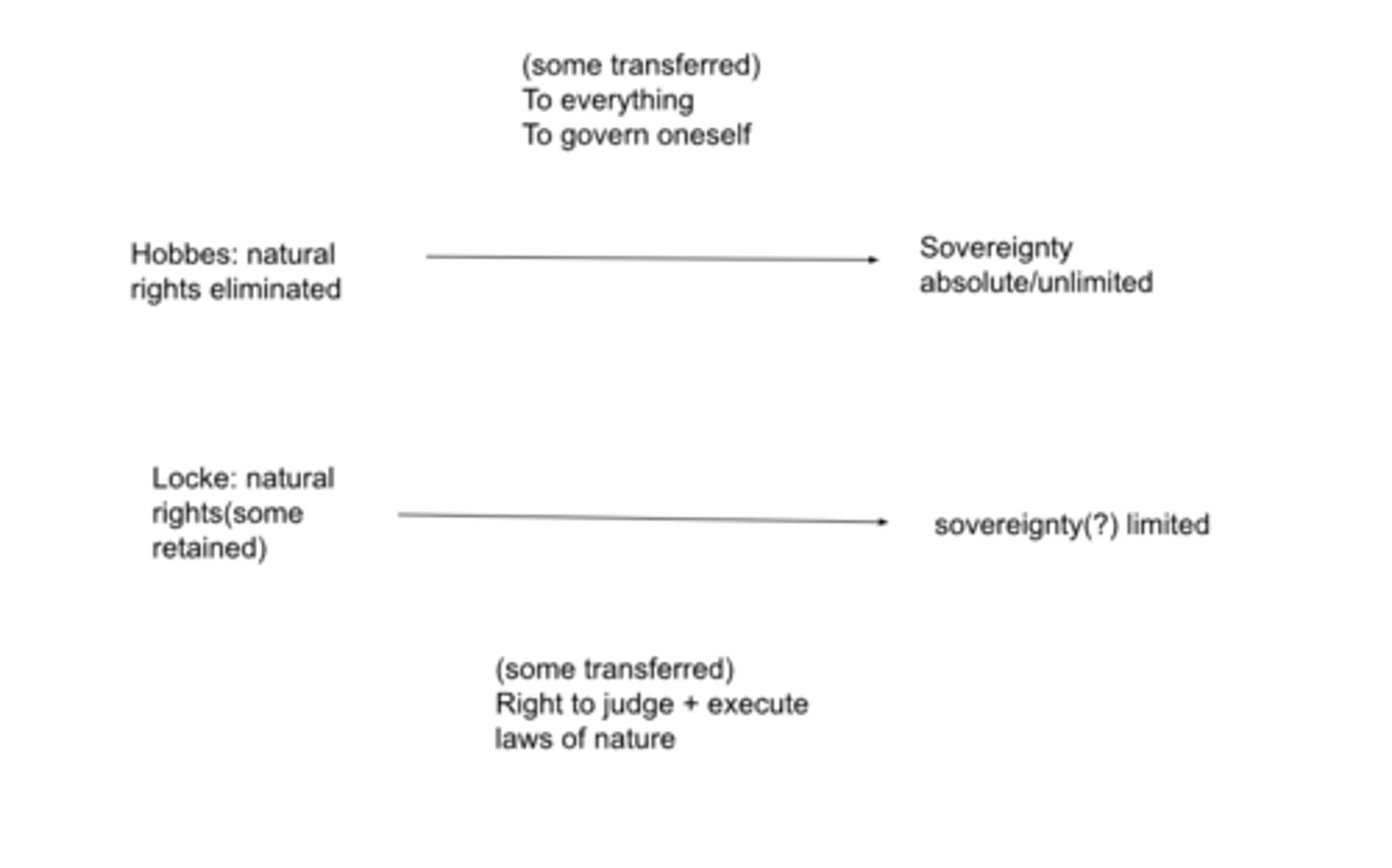
Hobbes vs Locke: natural obligations
-hobbes says there is no natural obligations
-locke says we do have natural obligations. We cannot live by ourself. We are by nature social. we or obligated to help preserve others
Hobbes vs locke: natural rights

Hobbes vs locke: the sovereign

Locke: right to property
-labor(source)
-use(limit)
-property is chief end to which governments are established
Hobbes vs locke: property
-when we mix our labor with the products of the earth, the earth becomes ours
-Hobbes: I catch a fish. Everyone else still has a right to the fish. Anyone could come along and take it from me and it wouldn't be unjust
-Locke: the fish I catch are mine. If someone came and took my fish they would be doing so unjustly
How does money come into play?
-we are bound by the moral law of nature
-we have a right to our property because of our labor, but resources are limited and we must leave enough do all and cannot waste
-ex: If I catch a bunch of fish, I have a right to those fish, but if I catch too much(more than I could use) and let them go to waste, I cannot claim the right to do so
-whatever you cannot use and would go to waste, belongs to others
-this is where gold/money come into play because gold does not spoil
Why we need government/sovereign
-the greater part of society are not strict observers of justice
-we must be restrained form invading others rights
-we are self-interested creatures
-no person is a good judge in their own case(people are bias to themselves and their friends)
-reason tells us we need to transfer our right to judge/execute the natural law (we don't get rid of it, we just transfer it to one common thing)
-since the rights we transferred ae limited, the sovereign is limited(no absolute or arbitrary power)
-not only can sovereign be divided, it must be divided
-nobody can transfer more power than he has for himself
different functions of sovereignty
-legislative(supreme but not absolute)
-executive
-federative(deals with foreign aid)
4 limitations of legislative
1. must aim the common good
2.uniform, standing laws apply equally to all
3.taxation must be based on consent
4.cannot be transferred without our consent
tyranny
-tyranny is the exercise of power beyond right
-nobody can have arbitrary power
-people can dissolve government if it acts tyrannically("a long train of abuses...")
-the government, when it becomes tyrannical, rebels against the people because we are the sovereign
taxation
-we have to pay out of our own property to maintain government, but this must be voluntary
-allows for different forms of government but leans towards democratic/republican form of government
-formation of social contract(government) is unanimous, but after government is formed, the majority must have authority
-no taxation without representation
Who is the sovereign?
-the people
-sovereignty is limited, conditional, divisible
-people can dissolve government if it acts tyrannically("a long train of abuses...")
-sovereignty does not grant rights because our natural rights are not granted, they come from god. The sovereignty can clarify rights
state of nature (rosseau)
-in state of nature we would not be in a state of war
-imagines a pure state of nature(thinks that Locke and Hobbes don't go far enough)
-a natural person is completely independent, self-sufficient, and capable of supplying their own needs/wants because our needs/wants are the same
-our human nature was completely covered by centuries of customs and traditions
-state of nature is a state of peace and best suited for the human race
-state of simplicity and independence
why doesn't Rousseau like society?
-progress in our arts/sciences has not led to our improvement(we become less capable of virtue and more capable of vice)
-war is a product of society
-society has oppressed us(we have lost our natural innocence)
-society has corrupted us
two natural principles prior to reason(what we are to our core)
1. every person is self-interested(self-preservation)
2.natural repugnance to the suffering of others(we only care about others when they are suffering)
what are human beings in the state of nature?
-free + independent
-self-sufficient
-isolated(indifferent)
-rational + passionate
-minimal needs/wants
-natural equality
-capacity to reason
-simplicity
what are our natural needs/wants?
-our natural needs/wants are few by nature
-we sleep under the tree we get our food from
-all we need is food, shelter, water, rest
-everything else that we think we need is a product of society
Why do we move away from state of nature? and what happens when we do?
-one thing that moves us away from state of nature is our own reasoning
-our reason does not make us moral
-reason is what engenders ego(turns men upon themself)
-our reasoning cancels out our natural sense of pity(ex: I am safe and sound, so who cares about everyone else)
-in state of nature we have a right to everything, but as we move toward society, people claim property
-our reasoning makes comparisons, which leads to us leaving the state of nature
comparisons
-in state of nature we need comparison in order to take care of ourselves
-as our species thrive, there will be more of a chance to encounter each other and compare ourselves to other(this is how humans acquire the feelings of merit and beauty)
-we want to be compared by others, we want people to value us, we want to be looked at
-comparison is the first step to property and vanity(inequality)
-once amour propre(vanity) emerges, state of nature is gone and we become more dependent on each other and trivial inequalities become important to us
amour de soi
-love of self
-natural
-healthy
amour propre
-vanity
-pride
-egotistical self-love
How are we different from other animals?
-the power of human reasoning exceeds everyone else in nature, but it doesn't make us different from them
-our freedom separates us from all other animals
-our reasoning only differs in degree to other animals(we are smarter only by degree)
-our freedom determines the essence of humans
-we are free to resist our impulses unlike every other animal
multiplicity of fresh needs
-human beings want more when we become vain/selfish
-we move from necessary needs to unnecessary needs
-human beings become insatiable, we need more things + power
what happens when power concentrates?
-power concentrates and laws make it that we become equally nothing
-as power concentrates and tyrants emerge, all private individuals become equal again and become nothing
-those subject to power, lose freedom
how is society a blessing?
-because of the social contract, society is really a blessing
- we do better when we shave off the yolk of tyranny
-we must recover our liberty
-the social order is a sacred right. served as a foundation of all other rights. we are not by nature social, so it is founded on conventions
-by the exercise of our own free will we consent to be governed and a social contract is made which redeems society and makes it a sacred right
clauses of social contract
-alienation of all rights to the community
-by giving them to all they give them to none
-we renounce all of our rights, retain none of them, but we cannot renounce our liberty
Hobbes vs Rousseau: sovereign and subjects relationship
-we rule as the sovereign and we are ruled as subjects
-we have to obey laws as individuals, but the laws come from us
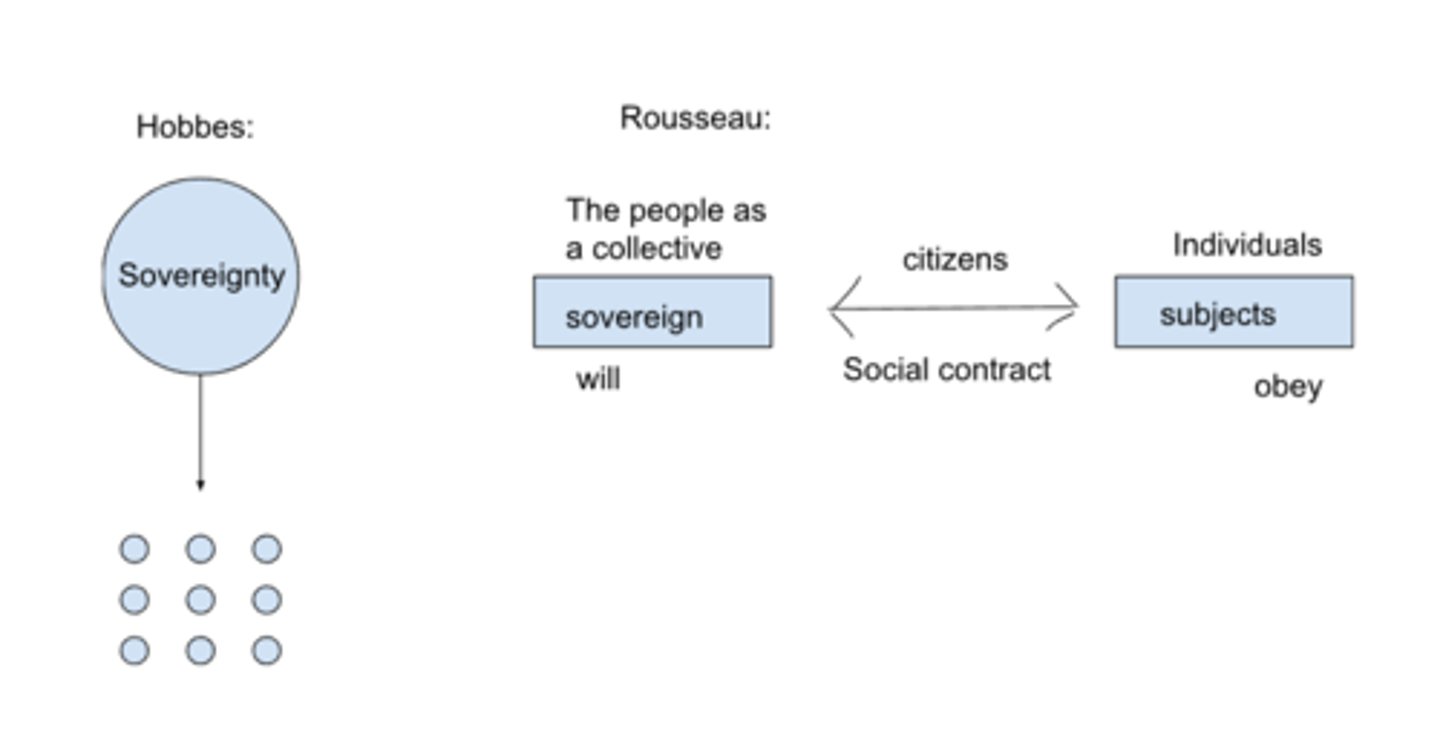
How is power distributed?
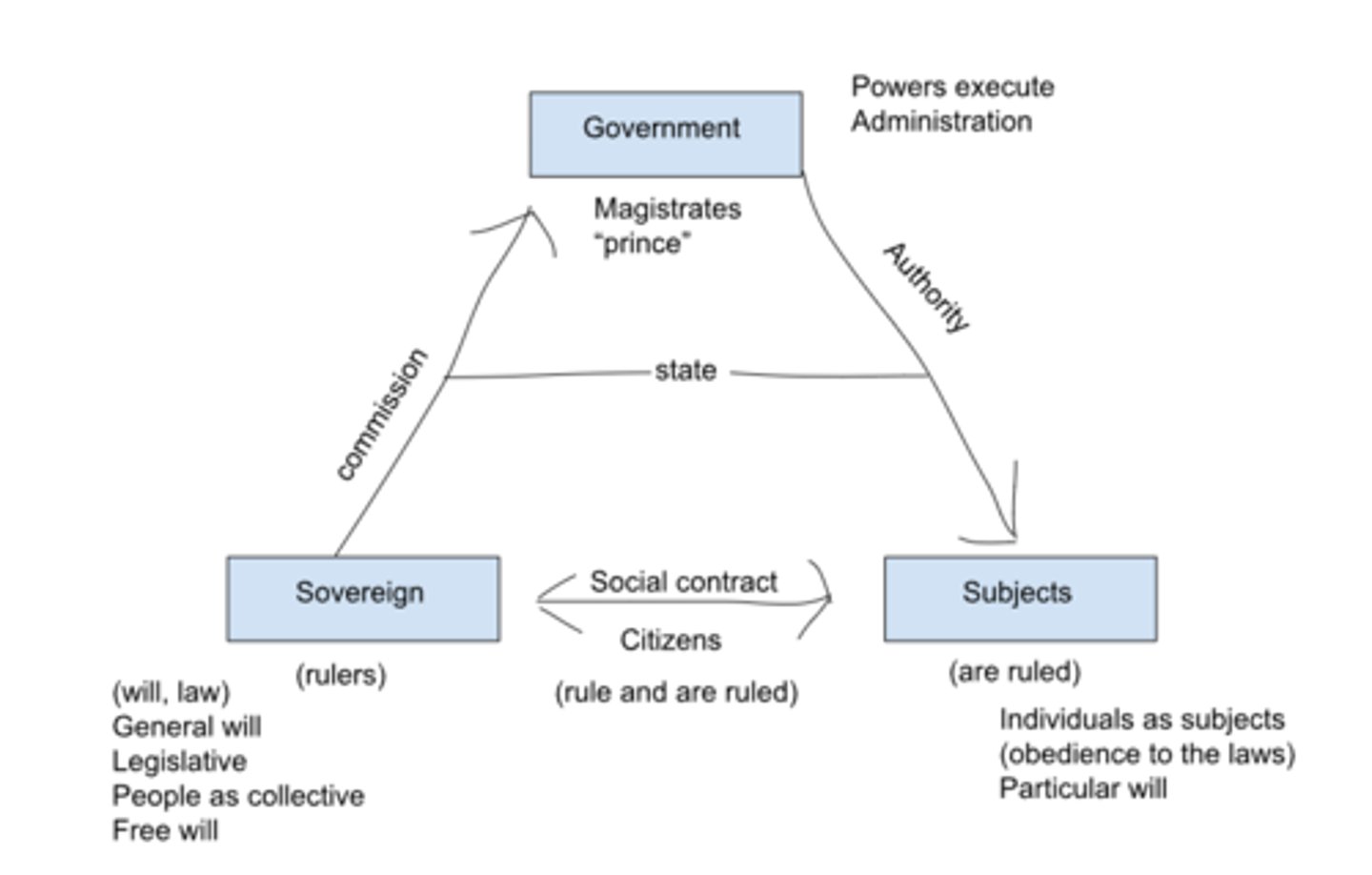
How does the triangle of power work?
-we alienate all of our natural rights(we retain none of them)
-all rights are conventional
-we cannot resource our free will(to renounce our free will would be to renounce our humanity, so we retain our free will)
-only the sovereign has the authority to legislate because law is the product of the will
-when those who represent us make laws, the laws they make only become law when we consent to it
-government acts as intermediary between sovereign and us as individuals(subjects)
-sovereign commissions government to have authority to execute laws but sovereign always retains free will
-the government receives from the sovereign the orders to give to the people
what type of regime does Rousseau seem to like?
-seems to be a champion of democracy, but some say he has anti-democratic aspects
-depends on conditions: big state= monarchy, medium state= aristocracy, small state= democracy
Rousseau's thoughts on democracy
-what you need for democracy: small state, little to no luxury, high degree of equality
-democracy is something that is beyond our humanity
-a city for the gods
-ideal but beyond our reach
what is the only legitimate regime?
-a republic is the only legitimate regime
-the only way we can be citizens, rule and be rules
-every state ruled by laws is a republic no matter the form of government
-every legitimate government is a republic
Different types of law
-particular, private(groups, individuals)
-will of all(NOT general will)(sum of all particular wills)
-general will
General will
-general will= liberty + equality
-general will is always right
-law is an expression of general will
-absolutely universal
-will of every person
-we are the source of it, but we also obey it
-directed at the common good(every human being)
-sovereign is the general will
-cannot be alienated
what happens if you refuse to follow general will?
-you will be forced to be free
How state of natures leads to society
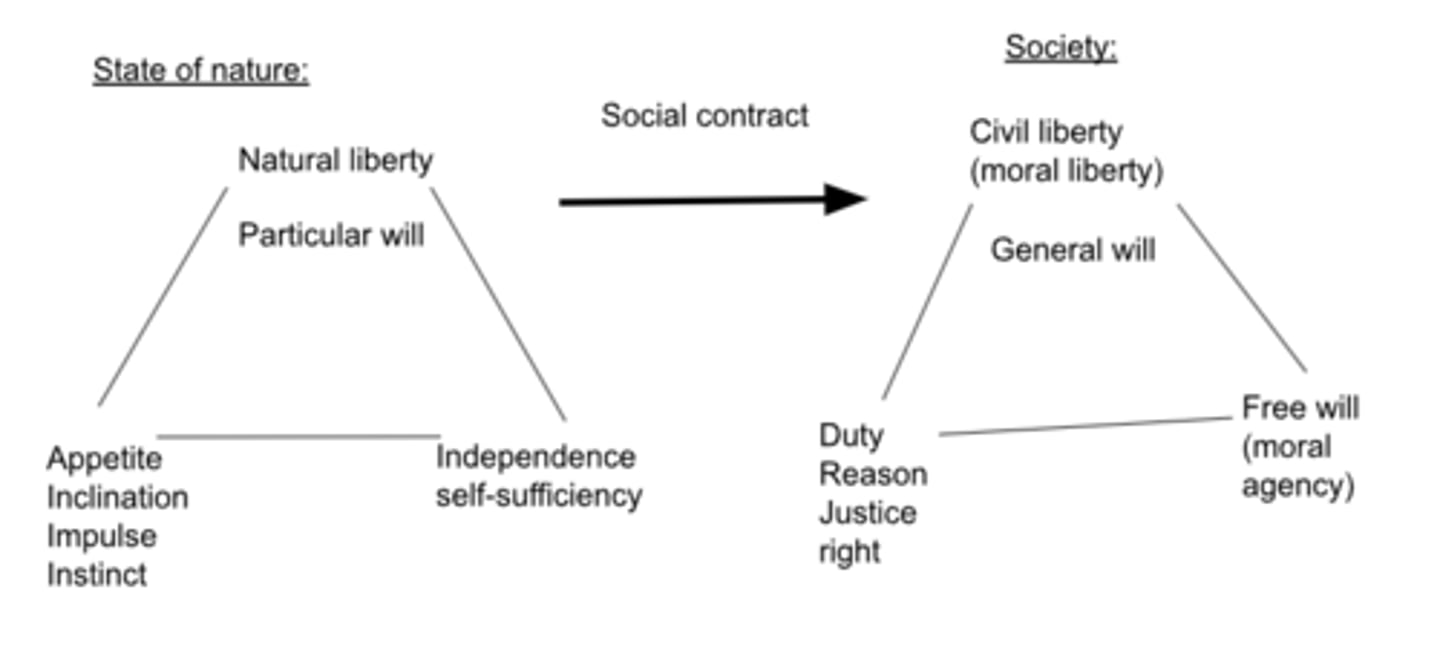
How is society a curse?
-we are condemned to leave state of nature
-we are no longer free like we were in state of nature
-when we move from nature into society there has been remarkable change in our humanity(our actions are given a moral quality)
-in state of nature we have minimal wants and the wants we do have are easily satisfied
How is society actually a blessing?
-we can reason against our inclinations in society
-something has to be made to redeem society(the social contract redeems society)
-we live as moral agents in society
-obedience to the law in society
-in state of nature we are driven by appetite alone and its like slavery(to only have natural liberty is slavery)(we are constantly being pushed and pulled by appetites)
Freedom(liberty) according to Hobbes, Locke, Montesquieu, St. Paul, Plato, and Rousseau
-Hobbes: absence of impediment, absent opposition
-Locke: natural right, bound + limited by moral law of nature
-Montesquieu: distinct from mere independence, shaped by laws natural + civil
-St. Paul: to love + serve others
-Plato: self- mastery, rule of reason in pursuit of the good
-Rousseau: obedience to a law we prescribe for ourselves